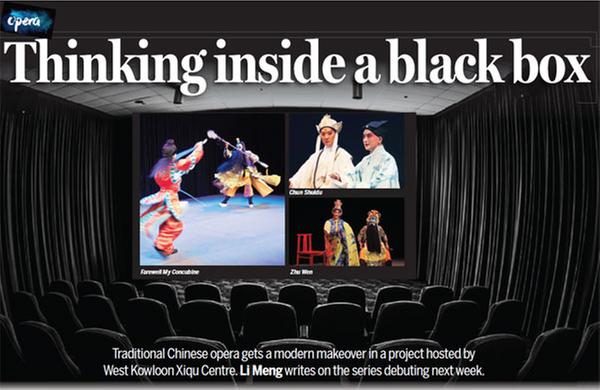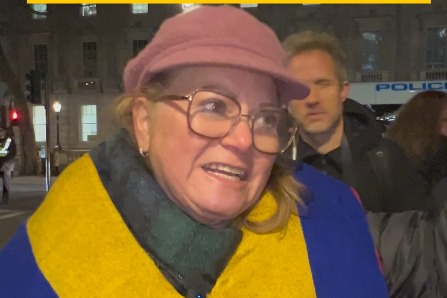Thinking inside a black box

Traditional Chinese opera gets a modern makeover in a project hosted by West Kowloon Xiqu Centre. Li Meng writes on the series debuting next week.
West Kowloon Xiqu Centre will present its first Experimental Chinese Opera Series next week in Hong Kong. Besides Farewell My Concubine, which has been developed locally, the three other productions are from Chinese mainland - Zhu Wen, Chun Shuidu, which is a fusion of Peking and Kunqu opera genres, and Kong Yiji. Together they would give the audiences an idea of the diversity of traditional Chinese opera forms and how they lend themselves to experimentation in the present time.
"We are exploring and discovering what Chinese opera would be in 2046," said Naomi Chung, manager of program and education at the West Kowloon Cultural District Authority, and curator of the week-long event.
Two local talents, Janet Wong Kit-fong and Keith Lai Yiu-wai, will participate in a new Cantonese adaptation of the opera Farewell My Concubine, a story most Chinese people in the audience would be familiar with. Wong and Lai have been working in tandem for more than five years. While the going has been good in terms of audience reception, both were looking to do something different from acting in a conventional production.
Wong has performed in various Cantonese opera productions since she took her degree from Hong Kong Academy for Performing Arts. "I sang in Princess Cheung Ping a lot of times," says Wong. "I am very much looking forward to producing my own works and finding my own path."

The chance to play a leading role in Farewell My Concubine was just such an opportunity. Since the performance venue is a black box theater, she is not required to make overly dramatic gestures to attract the attention of viewers who sit far away from the stage in traditional venues. Also, as the music director of the show, Wong has rearranged a few arias sung by the main characters to inject a whiff of freshness into this widely-known piece.
The show premiered at the Shanghai Experimental Xiqu Festival last winter.
"I felt very nervous before the performance," says Wong. On one hand they worried that a Shanghai audience may not be familiar with the opera format borrowed from southern China. On the other they were not sure how well the tweaking of a rather well-known story might go down with the audience. However, it turned out to be all good. The audiences reacted positively. The critics wrote encouraging reviews. In the lead-up to the production's Hong Kong debut, the team has been trying to build on their initial success.

"Cantonese opera singers usually work on a tight schedule," says Chung. "At times we have to discuss the production while eating." Most of the discussions were meant to work out a smooth unfolding of the plot and the modalities of adapting a traditional opera to a black box set-up.
"It is indeed challenging to perform in the experimental theater," says Wong who, being the daughter of the renowned Cantonese opera singer Wong Kam-tong, has grown up watching traditional performances. In her mind a Cantonese opera stage was associated with a huge performance area and elaborate props. The audience would be seated far away from the playing platform to reinforce a sense of fantasy.
The idea behind staging a Cantonese opera in the intimate space of a black-box theater was to create a strong connection between the actors and audience. The props are more abstract than specific. For instance, "the silk fabric used on stage could be imagined as a river, or some sort of a boundary between the real and spiritual world," says Lai who is both the screenplay writer and director of the production. Flexibility of interpretation, he says, lies at the core of experimental art. An opera that's open to interpretation spurs the imagination of viewers and generates a two-way communication between the performers and viewers.
A 90-minute capsule
While the departure from the conventional stage and light designs is quite obvious, the plot too looks somewhat different from earlier opera adaptations of the story. A traditional Cantonese opera performance, which usually lasts around four hours, has been pared down to a 90-minute version. In the first half, Xiang Yu, the self-proclaimed "overlord of Western Chu" and his troops are seen to be heading towards sure defeat in the hands of fellow warlord Liu Bang. Xiang sings a heartbreaking farewell song to his lover, Consort Yu who subsequently commits suicide. In the second half Consort Yu is back on stage as a ghost. And the mental agony of the hero who chose to go down bravely on the battlefield rather than call it quits, as his mistress had suggested, is once again in focus. Poignant arias were interpolated into the story to play up the tragic hero's sufferings.
Traditionally Cantonese opera fans do not look for psychological depths in a character. They are more interested in the techniques used by singers, the euphony of melodies and how spectacular the stage design is. Wong and Lai, however, were keen to remind the viewers of the emotional complexity in human beings. Lai, who plays Xiang Yu, says the historical figure could well serve as a mirror in which present-day audiences can see a reflection of their own experiences. He strongly feels traditional performance art forms require the injection of fresh ideas so as to not let them lose their currency.
Similarly, the three other productions, from Jiangsu and Fujian provinces, are about combining old and new ideas. For example, Liyuan Opera's Zhu Wen will unfold at a faster pace than in the conventional format and feature more vivacious characters.
The fusion of Peking Opera and Huaiju in Kong Yiji provides a new perspective for both performers and the audience. Elements of montage, flashbacks and other cinematic techniques have been applied to come up with a unique narrative style in Chun Shuidu.
The sets of both Kong Yiji, produced by Shanghai Huaiju Troupe and Chun Shuidu, commissioned by Shanghai Centre of Chinese Operas, are highly experimental too. There are resonances of minimalism and other contemporary art concepts in the stage design of these productions.
According to Wong, the interaction between stylistic features of the East and West as well as the old and new are key to experiments in Cantonese opera. "A new production should always fit the needs of the time," she says.
Farewell My Concubine will play in Beijing this November - a sign that projects developed in Hong Kong, involving local talents, are going places. Chung says one of the core ideas behind producing the experimental opera series was about facilitating a sharing of thoughts and skills between opera performers from across China. "Actors from different areas of China might connect with each other through the week-long event. Cantonese opera performers might take inspiration from the arias sung in Huaiju or Peking Opera," she says.
"This is just a beginning."

(HK Edition 09/01/2017 page9)





























